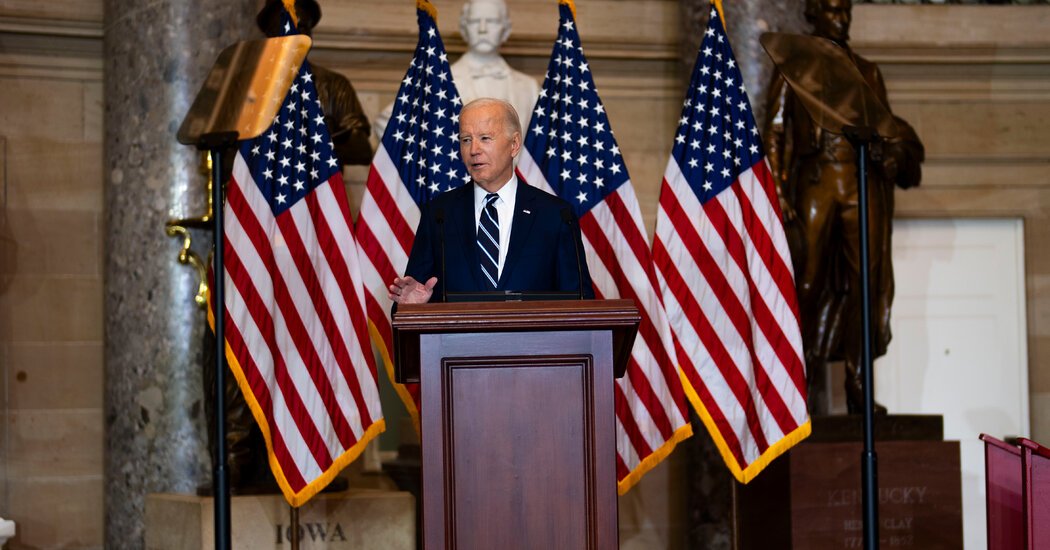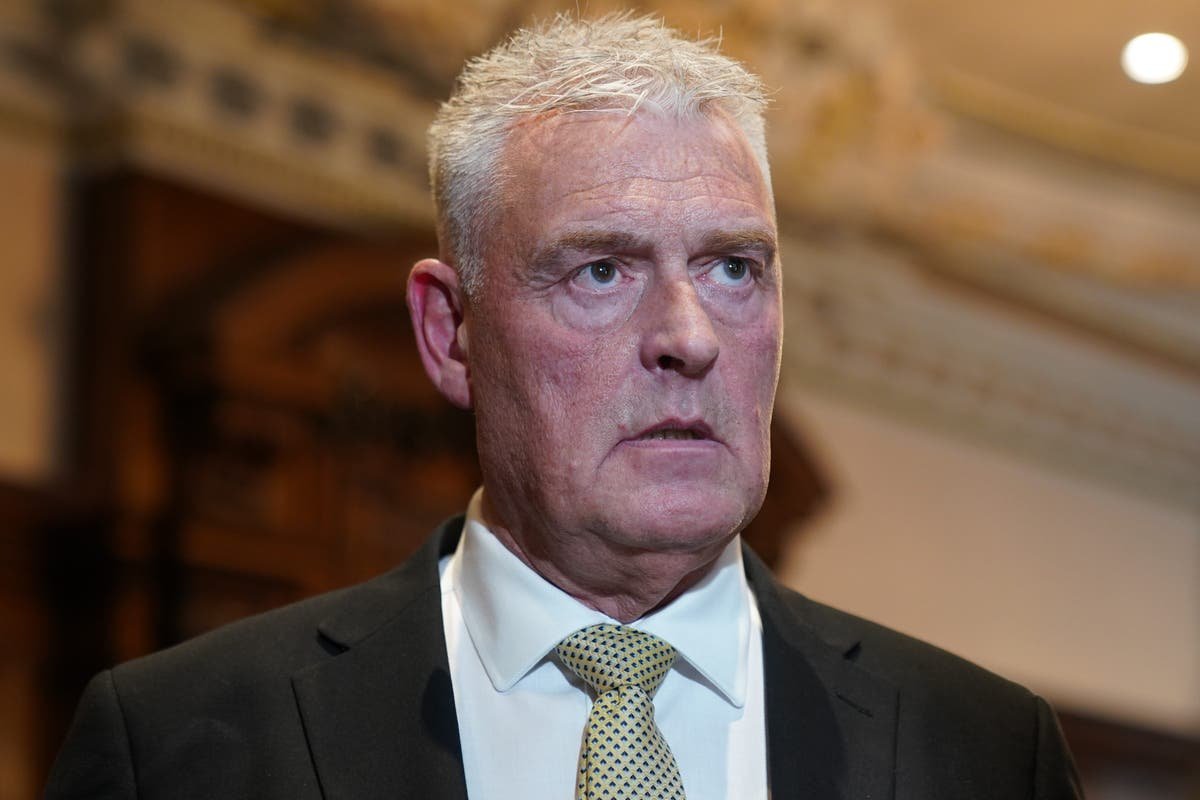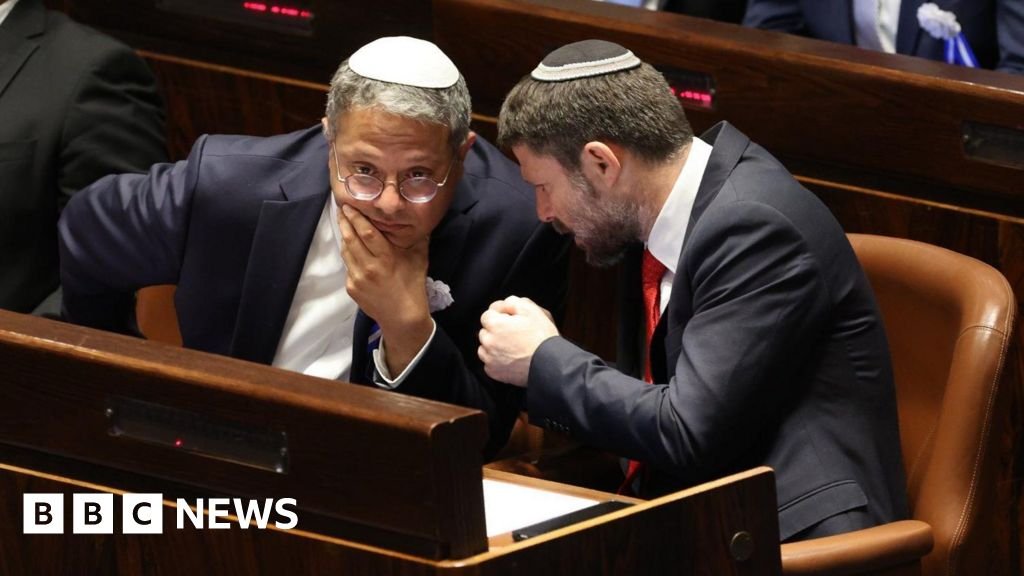President Biden on Thursday ordered broad financial and travel sanctions on Israeli settlers accused of violent attacks on Palestinians in the West Bank, a forceful gesture aimed in part at Arab American voters in the United States who have expressed fury about the president’s backing of Israel’s war in Gaza.
Mr. Biden authorized the sanctions with an executive order that goes further than a directive issued in December by the State Department, which imposed visa bans on dozens of Israeli settlers who have committed acts of violence in the West Bank. The sanctions will initially be imposed on four Israeli settlers, who will be cut off from the U.S. financial system and from accessing any American assets or property. They also will be prevented from traveling to the United States or engaging in any commerce with people in the United States.
For Mr. Biden, the order served a dual purpose: It was a sharp diplomatic notice to Israel’s government at a time when the United States is pressing Prime Minister Benjamin Netanyahu for restraint. But it also sent a message to Arab Americans, a key part of the political coalition he needs to be re-elected, that he is serious about using the power of the United States on behalf of the Palestinians.
The executive order comes after years of American frustration with Israeli settlers, whom they view as a source of violence and instability and a threat to a two-state solution between Israel and the Palestinians. And it comes as Mr. Biden faces growing criticism over U.S. support for Israel’s war in Gaza, including from members of his own party. American officials fear a recent surge in attacks by Israeli settlers against Palestinians in the West Bank could set off even wider violence, making an already combustible situation worse.

“This violence poses a grave threat to peace, security, and stability in the West Bank, Israel, and the Middle East region, and threatens the national security and foreign policy interests of the United States,” said Jake Sullivan, the president’s national security adviser.
Israel’s war against Hamas is taking place in the 141-square mile Gaza Strip, home to about two million Palestinians. But there are also deep tensions in the West Bank, a much larger area that Israel has occupied since 1967. It is home to more than 2.5 million Palestinians and has long been at the heart of the territorial dispute between Israelis and Palestinians.
Palestinians and many analysts say that Israel’s government has allowed the often heavily armed settlers to operate with impunity inside the West Bank. A United Nations report said that eight Palestinians were killed in the West Bank by Israeli settlers since Hamas fighters from Gaza invaded Israel on Oct. 7 and killed 1,200 people.
The office of Mr. Netanyahu responded to the sanctions by saying the “vast majority” of Israeli West Bank settlers are “law-abiding citizens.” Israel “acts against lawbreakers everywhere, so there is no need for exceptional steps in this matter,” Mr. Netanyahu’s office said in a statement.
The White House announced the sanctions just hours before Mr. Biden held a campaign event in Michigan, a critical battleground state that has a large Arab American population and has been the site of numerous protests over the war in Gaza.
Before leaving for Michigan, Mr. Biden spoke about what he said was “the trauma, the death and destruction in Israel and Gaza.” Speaking at the National Prayer Breakfast in Washington, he pledged to work for the release of hostages and the lives of Palestinians.
“Not only do we pray for peace, we are actively working for peace, security, dignity for the Israeli people and the Palestinian people,” he told the group of lawmakers and religious leaders at the event.
Michigan is vital to Mr. Biden’s campaign for a second term. In 2020, he won the state over former President Donald J. Trump by 154,188 votes out of almost 5.5 million cast that year. Michigan is home to several hundred thousand Arab Americans, most of whom live in the Detroit area. Those areas voted by big margins for Mr. Biden in 2020.
But since the attacks in Israel, polls show the president losing support among Arab Americans. One poll late last year showed Mr. Biden’s support in that population plummeting from 59 percent to 17 percent, a more than 40 percentage point decrease since the last election.
Mr. Biden has been dogged by people protesting his support for Israel at almost every campaign event in recent weeks.
Osama A. Siblani, publisher of the Dearborn-based Arab American News, said on Thursday that Mr. Biden’s standing among Arab voters was as low as it had ever been, and that the sanctions would do nothing to change that.
“We have given up on him doing anything,” Mr. Siblani said, adding that he had been struck by the lack of specificity from the White House about the president’s schedule in Michigan, which he said seemed like an attempt to avoid possible protests.
Before Mr. Biden’s travel on Thursday, the White House and the president’s re-election campaign had provided only scant information about where he was going.
“If the community is not going to be able to protest his visit,” Mr. Siblani said, “we’re going to give him the answer on Feb. 27,” a reference to the date of the Michigan Democratic presidential primary.
A spokeswoman for Mr. Biden’s campaign disputed the idea that the campaign was being secretive.
“The secrecy is being overstated,” said Lauren Hitt, the campaign spokeswoman, who noted that a local Michigan newspaper had written about unconfirmed reports that he would visit with auto workers earlier this week. “He does smaller retail events often. This format isn’t new.”
The anger directed at the president is largely fueled by the belief that his administration has not done enough to prevent the killing of thousands of Palestinians by Israel as it wages war in Gaza against Hamas. Authorities in Gaza say at least 26,000 people have been killed during Israel’s military campaign.
Officials said the sanctions will not be levied against American citizens living in Israel. State Department officials identified the four Israeli settlers who were named in the sanctions on Thursday as: David Chai Chasdai, Einan Tanjil, Shalom Zicherman and Yinon Levi.
In a news release on Thursday, officials said Mr. Chasdai “initiated and led a riot” resulting in the death of a Palestinian civilian and assaulted other Palestinians. They said Mr. Tanjil was “involved in assaulting Palestinian farmers and Israeli activists by attacking them with stones and clubs.”
Mr. Zicherman “assaulted Israeli activists and their vehicles in the West Bank,” officials said, citing video evidence. They said Mr. Levi threatened “violence if they did not leave their homes, burned their fields, and destroyed their property” in the West Bank.
Secretary of State Antony J. Blinken said in a statement that the sanctions are designed in part to pressure Israel’s government to prevent the kind of violence by its citizens against Palestinians living in the West Bank.
“The United States has consistently opposed actions that undermine stability in the West Bank and the prospects of peace and security for Israelis and Palestinians alike,” Mr. Blinken said. “Israel must do more to stop violence against civilians in the West Bank and hold accountable those responsible for it.”
Mitch Smith and Zach Montague contributed reporting.










